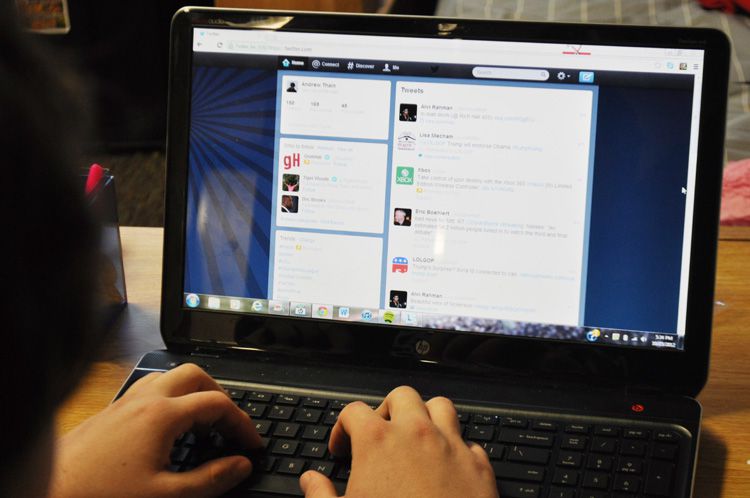Although professors often encourage students to put their electronic devices away during class, Kathy Vigil, a Boston University School of Education instructor, said she asks her graduate students to tweet relevant content and discussion points using the class’s hashtag, #EM585.

“Everyone can share that way [on Twitter], so it’s also kind of equalizing,” she said. “It’s not just information coming from the teacher to the students, but students are also the ones to contribute, which is kind of empowering for today’s students.”
Twitter may have a positive effect on how students learn, according to an October study at Michigan State University.
Christine Greenhow and Benjamin Gleason, authors of “Twitteracy: Tweeting as a New Literacy Practice,” define the social network as a new source of technological literacy for students.
Twitter has positive effects on student performance, including increased engagement, improved student-teacher and peer relationships, active learning and higher grades, according to the study.
The study also suggested that Twitter might improve writing skills by opening the door to a more informal style of writing that could foster creativity in student composition.
Although some BU professors said Twitter has a place in the classroom, they noted that it could also present some drawbacks.
SED professor Laura Jiménez, who received her graduate degree from MSU and is familiar with the study, said the effects of having Twitter in the classroom depend on how the teacher implements its use — it could be as beneficial as it could be detrimental.
“I’m excited by Greenhow’s work because she’s looking at a quote-on-quote problem in a different way,” Jiménez said.
Jiménez said there is a difference between classrooms where the use of Twitter and other social medias for educational purposes is encouraged and classrooms where outside digital communications are strictly prohibited.
“In a lot of ways, I think trying to keep that stuff out of the classroom, out of academic environments, is a mistake,” Jiménez said.
College of Communication Associate Dean Tammy Vigil said she uses Twitter in her “World of Communication,” course.
“I find that it’s actually quite useful for my class, particularly because of its [the class’s] size,” Tammy Vigil said.
In the weeks leading up to an exam, Tammy Vigil said she tweets questions related to study topics that student followers are encouraged to answer.
“When a professor uses it the way that I do, it can be useful because you can use it as a study guide and an additional avenue for contact with professors,” she said.
Although Twitter may be used as one form of communication between students and professors, she said it is important for students to not become too dependent on it.
“It also sort of prevents you from building the skill set of talking to people in authority positions and getting comfortable doing that,” she said. “So that can also be a little bit of a drawback.”
Tammy Vigil said Twitter could have a harmful effect on students’ grammar because the word limit encourages overly abbreviated and poorly punctuated tweets.
“It also sometimes encourages a shorthand that students will sometimes carry over into other writing where it’s not as appropriate,” she said. “So you have to be careful about making sure you understand which tools are appropriate in which venues.”
COM senior Kara Andrew said she uses her Twitter for both personal and professional purposes, but not for academics.
“I don’t really use it too much for academic purposes other than if I see an interesting article from an ad agency, I’ll retweet it, but usually I’ll use it more for social,” Andrew said.
Andrew said although she does not use Twitter to communicate with any of her professors, she does follow other professionals.
“It has had a positive influence on me because I follow educational or professional handles, like other advertising agencies, CNN news or other random news stations that I can get my news from,” she said.
COM graduate student Todd Buckholt said he knows few other students who use Twitter for academic purposes.
“Students, from my experience, just use it more for entertainment and socializing rather than actually using it for learning purposes,” he said.
SED senior Lori Hobson says she does not necessarily use Twitter for academic purposes.
“It depends on who you follow,” she said. “None of my professors have Twitter. Although, I do follow a teacher’s blog on Twitter, and they posts tips on how to get a job after you graduate, so that’s kind of educational.”



















































































































cfa level 2 practice exams 2023 • Feb 5, 2013 at 11:59 am
What precisely degrees are acceptable for obtain into the CFA program?